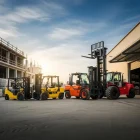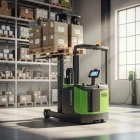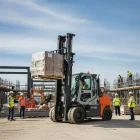As we navigate towards the end of 2023, there’s a cautious optimism in the air within the construction industry, and more broadly, the Australian economy as well. The recent insights shared by top economists indicate that manufacturing and infrastructure construction sectors will likely continue their growth trajectory. However, like the rest of the world, we’re not without our challenges here in Sydney, especially when it comes to construction and the vital machinery that keeps it all moving—like forklifts.
With federal infrastructure spending holding strong, particularly in critical sectors such as sewage, waste disposal, and water supply, there’s an increase in demand for reliable and efficient heavy machinery. This makes it a notable time for those considering forklift hire in Sydney. A surge in commercial construction projects can significantly raise the need for forklifts to maneuver materials across sprawling sites, and a timely rental can be the difference between keeping pace with competition and falling behind.
Labor shortages are still a universal stumbling block for the industry, which underscores the importance of maximizing productivity with the resources available. By opting for forklift hire, companies can scale their fleets according to the project demands without the long-term financial commitment of purchasing outright. For businesses wary about the potential for a recession in 2024, rental offers a flexible and cost-effective solution.
Despite the slower growth in office construction and the decline in multifamily housing permits noted globally, the need for efficient logistics and materials handling remains high. Forklift repair services have therefore become even more pivotal. Ensuring that your forklifts are in prime condition through reputable forklift servicing in Sydney means preventing costly downtime and maintaining productivity, no matter the economic headwinds.
With uncertainties about financing projects and the fluctuating costs of materials, maintaining a fleet of forklifts can be a challenge. Here’s where forklift servicing and repairs play a crucial role. Regularly maintained forklifts are more reliable, suffer fewer breakdowns, and have longer service lives, thus presenting long-term cost savings and operational reliability.
The debate between using a diesel forklift versus an electric forklift is also more relevant than ever. With environmental considerations and the cost of fuel to account for, electric forklifts are gaining popularity in urban construction settings like Sydney, where emissions regulations are strict, and noise pollution is a concern. However, there’s still a strong argument for the power and versatility of diesel forklifts, particularly in heavy-duty environments where longer operating times and higher torque are needed.
For those who are already using or considering a Toyota Forklift or any other brand, it’s essential to evaluate your specific needs against the backdrop of these economic projections. The right forklift choice can significantly influence the efficiency of your operation, especially in times of economic uncertainty. Assess the nature of your projects, operational capacity, and financial strategy before making a decision. No matter the circumstances, the consistent goal should be to optimize the performance and utility of your fleet, whether you’re hiring, servicing, or contemplating the type of forklift that best suits your business needs.
Indeed, with construction employment rates experiencing diverse changes across regions, Sydney-based companies must focus on the local labor market and asset optimization. This data informs us that a regional approach can be beneficial. While Wisconsin sees a 1.1% growth rate, the national average spans higher, suggesting varying levels of demand in different local economies. Translating this to the Sydney context, investing in local services like forklift hire and servicing, which can adapt to the unique Sydney market conditions, may give businesses a competitive edge.
Even with divided expert opinions on the 2024 economy, the courses of action for construction-related businesses seem clear. Staying agile in the face of fluctuating construction trends, closely managing fleets, and maintaining machinery through top-notch forklift servicing and repairs are strategies that can help weather potential economic storms. Ultimately, those businesses that fine-tune their operational efficacy and maintain flexibility in their equipment management are likely to emerge stronger and more competitive in the ever-evolving landscape of the construction industry.




